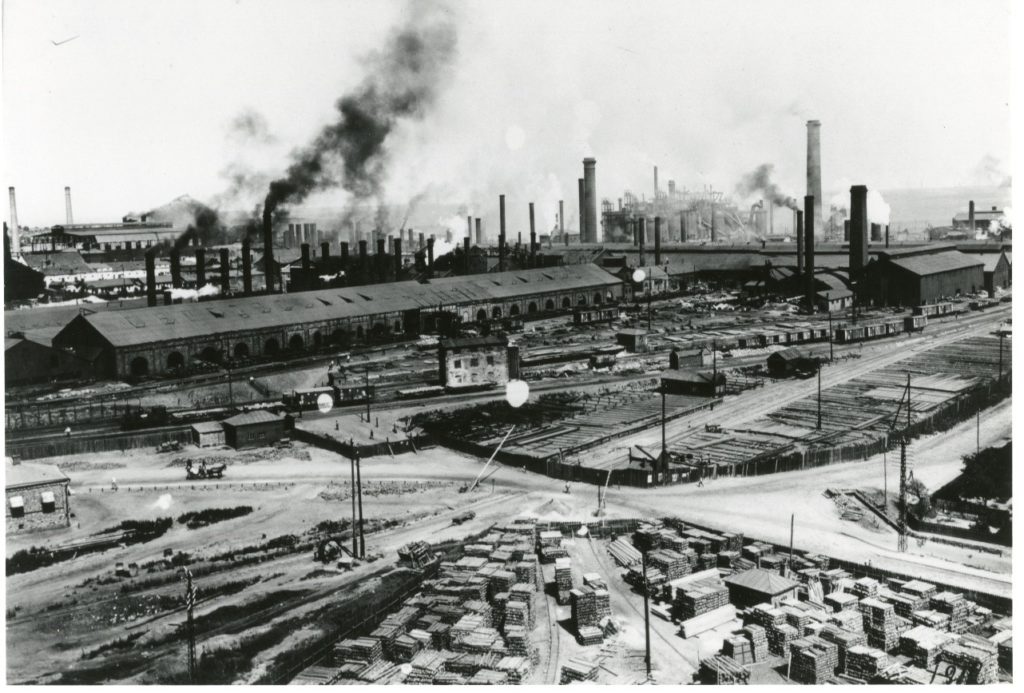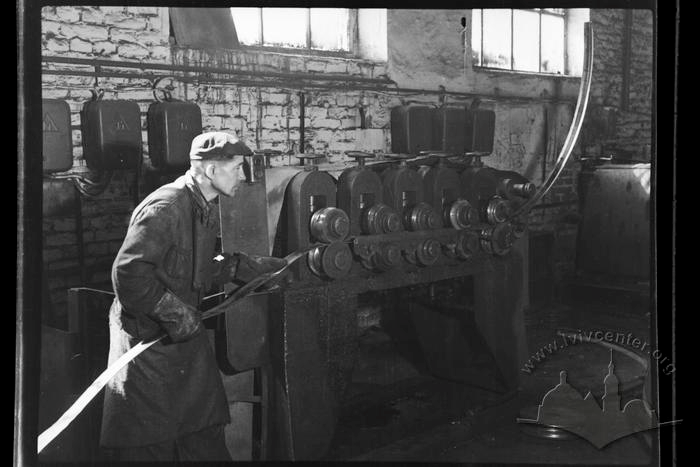Building artistry from industry
The war in Donbas, Ukraine, has resulted in the deaths of over 13,000 people and displaced a further 1.6 million since it began in 2014. Dr Donovan, of the School of Modern Languages, has demonstrated that the challenges of de-industrialisation are key to understanding the causes of this conflict. Her research has engaged professionals, creatives and broader audiences in Ukraine and the UK, enlarging collections, shifting public perceptions of history and developing entirely new practices within heritage industries.

Donovan’s research highlights the social and cultural consequences of the closure of many mines and steelworks in the 1990s, after which communities were faced with unemployment, declining populations, and infrastructure collapse. Her research has taken her to industrial archives in Wales and Ukraine, where she has worked with their collections to explore the ways in which industrial landscapes and communities have been represented in visual media across the centuries. Her research has underlined the commonalities between post-industrial communities across Europe, and Donovan has used these commonalities to initiate dialogue and idea exchange between regions.
Donovan’s research has brought public awareness to a rich and largely overlooked history of Welsh labour migration to Donbas in the late 1800s, which she discovered while working with the Glamorgan Archives in Cardiff. This connection led Donovan to establish a partnership between the Glamorgan Archives and the Donetsk Local History Museum, which resulted in the transfer of over 1,000 documents from Wales to Ukraine in 2019 after the Donetsk Local History Museum lost most of its archive during the Donbas war. This connection, and Donovan’s research, has implications not just for how we look at the past, but also for our perception of cultural artefacts in the present and the future.
Preserving the past (click to expand)

In connection with Donovan’s research, and in collaboration with the Centre for Urban History of East Central Europe in Lviv, Ukraine, private, personal and institutional archives have been digitised, making them accessible to broader audiences around the world. This included almost 1,000 photographs and videos housed at vulnerable archives across Ukraine, which might otherwise have been destroyed. The newly digitised materials were presented during a socially distanced “Home Movie Day” in Lviv in November 2020, which was attended by young creatives and the families of those who had donated to the collections, as well as members of the public.
In partnership with Ukrainian and UK researchers and practitioners, Donovan has worked closely with heritage professionals and creatives to develop new methods, practices and resources in the heritage industries in Ukraine and the UK. This included the publication of an entirely new collection of reference and training resources for professionals in the heritage industry, which were supported by a series of workshops and seminars across both the UK and Ukraine. Together, these developments had tangible impacts on cultural practices in Ukraine and the UK. The collaborative approaches modelled in the workshops, for instance, were used in a schools photography workshop on the oil shale bings of West Lothian, Scotland in July 2021 and at the “Un/archiving Post/industry” Summer School for artists in Pokrovsk in July 2021.
Fostering the new (click to expand)
Donovan’s work was highlighted in a major exhibition, which was shown around both Wales and Ukraine in four separate locations. The exhibition was co-created with Welsh artist-researcher, Stefhan Caddick, and led to a series of further collaborations. These included a participatory artwork titled, Enthusiasm, which explored Welsh migration to Ukraine through photography, music, performance and community crafts during its tenure at Red House in Merthyr Tydfil. Included at this festival was the first-ever performance of a new musical score, composed by Welsh musician Simon Gore, to accompany Dziga Vertov’s 1931 silent film, ‘Enthusiasm: The Donbass Symphony’. 112 people attended the performance. The piece was subsequently screened for audiences in Edinburgh and Durham.
Materials from the exhibition went on to be used by Peak: Art in the Black Mountains, a local arts charity, to coordinate a creative writing workshop with pupils in a local primary school. This event was to become a pilot for a much larger series of initiatives, which came about due to the positive reaction to Peak’s initial workshop – the use of ‘real’ history, directly related to the school’s community, was found to have a very strong impact. As a result, Peak has used social history as a tool of engagement across all its projects. The initiative was subsequently taken up by People’s Collection Wales, who invited Donovan to develop a set of classroom resources for the Curriculum for Wales website.
The exhibition was covered widely in the media of both Ukraine and Wales. This included major newspapers such as The Telegraph, as well as broadcast media including Radio Svoboda and BBC Radio Wales, which featured an interview with Donovan discussing the impact of her research. In 2016 she was one of 10 academics named as the New Generation Thinkers at Hay Festival, which reflected the vitality of her work and contributed to its broad impact. The exhibition also had an impact on those who attended. Testimonials and exit questionnaires revealed that the exhibition had altered audience perceptions, and even changed personal and career trajectories, including enthusing one Welsh-Ukrainian volunteer to learn Polish to aid her in her ambitions to work as a midwife with Polish-speaking communities in the local area. Donovan’s work shows that humanities research can have a tangible and significant impact on people’s lives and showcases the potential for innovative research to make a difference.